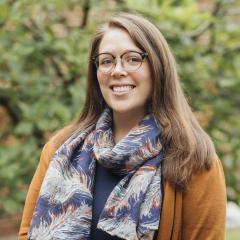About Mackenzie's Work
Kenzie is a driven integrative evolutionary biologist and avian conservation geneticist with a specialization in the ecology and conservation of tidal saltmarsh endemic birds. She holds two Bachelor of Science degrees from the University of New Haven (in Biology and Forensic Biology), a Master of Science in Biology from Austin Peay State University, and is currently a Ph.D. candidate at the University of Maine. She is a member of both the Saltmarsh Habitat and Avian Research Program (SHARP) and the National Science Foundation-funded Genomic Ecology of Coastal Organisms (GECO) working group. In her work, she uses birds as bioindicators for habitats imperiled by climate change and genomic tools to understand how those birds are being changed across space and time. Her current research encompasses a diverse range of disciplines including ornithology, evolutionary ecology, quantitative genomics, bioacoustics, and thermal physiology. By integrating genomic techniques with measures of performance and fitness, she aims to understand the genomic architecture underlying complex traits. With a profound passion for understanding the avian world and the mechanisms driving evolutionary processes, Kenzie's work sheds light on the fascinating interplay between genes, traits, and the environment.
Beyond the realm of research, Kenzie is deeply committed to pedagogy and community outreach. She is on the leadership team of her local chapter of the American Association of University Women (AAUW) and is the Program Manager at Hirundo Wildlife Refuge. Driven by a strong desire to make science accessible and engaging, she is particularly interested in curriculum design that incorporates modern, active learning approaches. Further, she actively seeks opportunities to develop programs that foster public engagement and inspire people of all ages and backgrounds to appreciate and explore the wonders of the natural world. Her future goals include the continued application of genetic techniques to the conservation of biodiversity, increasing the diversity of perspectives in ecology, and building a community environment that prioritizes conservation through public engagement.

